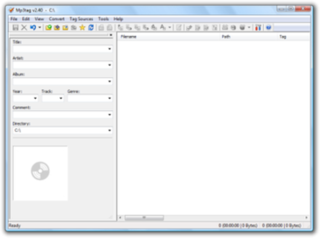Monkey's Audio is an algorithm and file format for lossless audio data compression. Lossless data compression does not discard data during the process of encoding, unlike lossy compression methods such as Advanced Audio Coding, MP3, Vorbis, and Opus. Therefore, it may be decompressed to a file that is identical to the source material.

foobar2000 is a freeware audio player for Microsoft Windows, iOS and Android developed by Peter Pawłowski. It has a modular design, which provides user flexibility in configuration and customization. Standard "skin" elements can be individually augmented or replaced with different dials and buttons, as well as visualizers such as waveform, oscilloscope, spectrum, spectrogram (waterfall), peak and smoothed VU meters. foobar2000 offers third-party user interface modifications through a software development kit (SDK).
Musepack or MPC is an open source lossy audio codec, specifically optimized for transparent compression of stereo audio at bitrates of 160–180 kbit/s. It was formerly known as MPEGplus, MPEG+ or MP+.
ReplayGain is a proposed technical standard published by David Robinson in 2001 to measure and normalize the perceived loudness of audio in computer audio formats such as MP3 and Ogg Vorbis. It allows media players to normalize loudness for individual tracks or albums. This avoids the common problem of having to manually adjust volume levels between tracks when playing audio files from albums that have been mastered at different loudness levels.
WavPack is a free and open-source lossless audio compression format and application implementing the format. It is unique in the way that it supports hybrid audio compression alongside normal compression which is similar to how FLAC works. It also supports compressing a wide variety of lossless formats, including various variants of PCM and also DSD as used in SACDs, together with its support for surround audio.
Gapless playback is the uninterrupted playback of consecutive audio tracks, such that relative time distances in the original audio source are preserved over track boundaries on playback. For this to be useful, other artifacts at track boundaries should not be severed either. Gapless playback is common with compact discs, gramophone records, or tapes, but is not always available with other formats that employ compressed digital audio. The absence of gapless playback is a source of annoyance to listeners of music where tracks are meant to segue into each other, such as some classical music, progressive rock, concept albums, electronic music, and live recordings with audience noise between tracks.
Music Player Daemon (MPD) is a free and open source music player server. It plays audio files, organizes playlists and maintains a music database. In order to interact with it, a client program is needed. The MPD distribution includes mpc, a simple command line client.

Music On Console (MOC) is an ncurses-based console audio player for Linux/UNIX. It was originally written by Damian Pietras, and is currently maintained by John Fitzgerald. It is designed to be powerful and easy to use, with an interface inspired by the Midnight Commander console file manager. The default interface layout comprises a file list in the left pane with the playlist on the right. It is configurable with customizable key bindings, color schemes and interface layouts. MOC comes with several themes defined in text files, which can be modified to create new layouts. It supports ALSA, OSS or JACK outputs.

cmus is a small and fast console audio player for Unix-like operating systems. cmus is distributed under the terms of the GPL-2.0-or-later and operates exclusively through a text-based user interface, built with ncurses.

EasyTag is a graphical tag editor that is part of the GNOME project. EasyTag runs on Linux and Microsoft Windows, and there was an attempt to bring EasyTAG to OS X circa 2014. It is written in C and relies on GTK+ and id3lib for graphics and ID3 tag handling respectively. As of version 2.1.1, EasyTag also uses the tag manipulation library provided by the MAD project, for support of ID3v2.4.

Mp3tag is a metadata tag editor that supports many popular audio file formats. It is freeware for Microsoft Windows, while it costs USD $19.99 for Apple macOS in the Mac App Store.

aTunes is a free and open source audio player with MPlayer as its playback engine. aTunes supports MP3, Ogg Vorbis, FLAC and other formats. aTunes allows users to edit tags, organize music and rip audio CDs easily.

The Sansa Fuze is a portable media player developed by SanDisk and released on March 8, 2008. The Fuze is available in three different Flash memory capacities: 2 GB, 4 GB, and 8 GB and comes in six different colors: black, blue, pink, red, silver, and white. Storage is expandable via a microSDHC slot with capacity up to 32 GB, and unofficially to 64 GB or more via FAT32 formatted SDXC cards. All models have a 1.9 inch TFT LCD display with a resolution of 220 by 176 pixels and a built-in monaural microphone and FM tuner; recordings of the latter two are saved as PCM WAV files.

Simplified Universal Player Encoder & Recorder (SUPER) is a closed-source adware front end for open-source software video players and encoders provided by the FFmpeg, MEncoder, MPlayer, x264, ffmpeg2theora, musepack, Monkey's Audio, True Audio, WavPack, libavcodec, and the Theora/Vorbis RealProducer plugIn projects. It was first released in 2005. SUPER provides a graphical user interface to these back-end programs, which use a command-line interface.

MusicBee is a freeware media player for playback and organization of audio files on Microsoft Windows, built using the BASS audio library.

AIMP is a freeware audio player for Windows and Android, originally developed by Russian developer Artem Izmaylov.

TagLib is a free library for reading and editing metadata embedded into audio files.

Puddletag is a graphical audio file metadata editor ("tagger") for Unix-like operating systems.

Kid3 is an open-source cross-platform audio tag editor for many audio file formats. It supports DSF, MP3, Ogg, FLAC, MPC, MPEG-4 (mp4/m4a/m4b), AAC, Opus, SPX, TrueAudio, APE, WavPack, WMA, WAV, AIFF, tracker modules.














